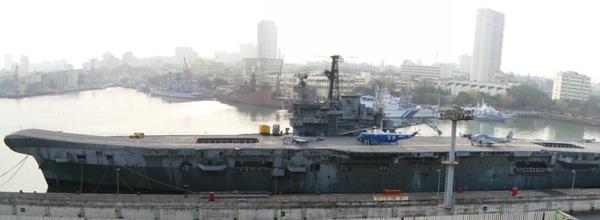India’s Blue-Water Navy – Staredown in Bay of Bengal, 1971

No one envied Captain Swaraj Prakash in December 1971. Prakash commanded India’s sole aircraft carrier, INS Vikrant, which weighed just 20,000 tons. His opponent: US Navy Task Force 74 led by the USS Enterprise, weighing in at 95,000 tons. Enterprise was also battle-hardened from years of combat off the coast of Vietnam. How did Prakash find himself in such an unenviable position?
India and Pakistan had been at each other’s throat since independence from Great Britain in 1947. At that time, the Indian Subcontinent was partitioned into the two nations. Pakistan consisted of West and East Pakistan, with India in the middle.
They simply did not get along and fought a border war in 1965. West Pakistan traditionally dominated East Pakistan. That ended in 1971 when East Pakistan declared independence and renamed itself Bangladesh.
The West Pakistan Army brutally put down the independence movement and millions of refugees streamed into India. Tensions rose. Pakistan gambled and launched a pre-emptive air strike on India. War broke out and India invaded East Pakistan. In the Bay of Bengal, the Vikrant led a blockade imposed against East Pakistan.
Few neutrals existed during the Cold War. The Subcontinent was no different. India aligned with the Soviet Union. Pakistan was an ally of the United States.
Then–US President Richard Nixon saw the world through a balance of power and prestige in international relations. He feared Indian dominance of the region and tried diplomatically to stop India’s advance through a ceasefire.
When that failed, he turned toward military pressure. Nixon ordered Task Force 74 to the Bay of Bengal, setting the stage for a potential showdown between Captain Prakesh’s Vikrant and the Enterprise.
That bout never occurred. West Pakistan forces in Bangladesh surrendered on December 16. Task Force 74 moved off.
Had Nixon moved too slowly? Was he only bluffing? Secretary of State Dr. Henry Kissinger said, "Everyone knows how all this will come out, and everyone knows that India will ultimately occupy East Pakistan. We must therefore make clear our position relative to our greater strategy."
India could never be sure of Nixon’s intentions but they had certainly witnessed his capabilities. They did not like the fact that a foreign navy had intervened in waters that close to India.
Even with an aircraft carrier, India was a coastal navy in 1971. For India’s politicians this simply would not do. From now on, India must have a blue water navy. Her navy would dominate waters around India with strong forces operating well off her coasts.
* * *
The Indian Navy has progressed over the last four decades. It conducts operations far from India with anti-piracy patrols off Somalia. Indian frigates have killed a number of pirates and captured their vessels. India has also deployed maritime patrol aircraft to the distant Seychelles Islands. Even further afield, India dispatched vessels to Libya in February to evacuate Indian nationals.
India is also embarked on a major expansion of her fleet. The 1971-era Vikrant is long gone, but India is building a new Vikrant twice as large along with a sister ship. India has purchased an ex-Russian aircraft carrier along with MiG-29s to fly from it.
The program in submarines is just as ambitious. An ex-Russian Akula II nuclear attack submarine has just been leased. The first of six French Scropene submarines will start joining the fleet in 2015.
Numerous frigates and corvettes are also being built in India. She will replace her aging maritime aircraft with American P-8s.
A lot has changed since 1971. India and Pakistan still don’t get along, but India and the United States are friends. The rise of China, particularly Chinese desire for a blue-water navy, causes concern from the Indian Navy. But India seems determined that the future captains of the INS Vikrant are a much formidable opponent against anyone challenging India.
About the Author:

Hans Johnson is a freelance writer who lives in Florida.

